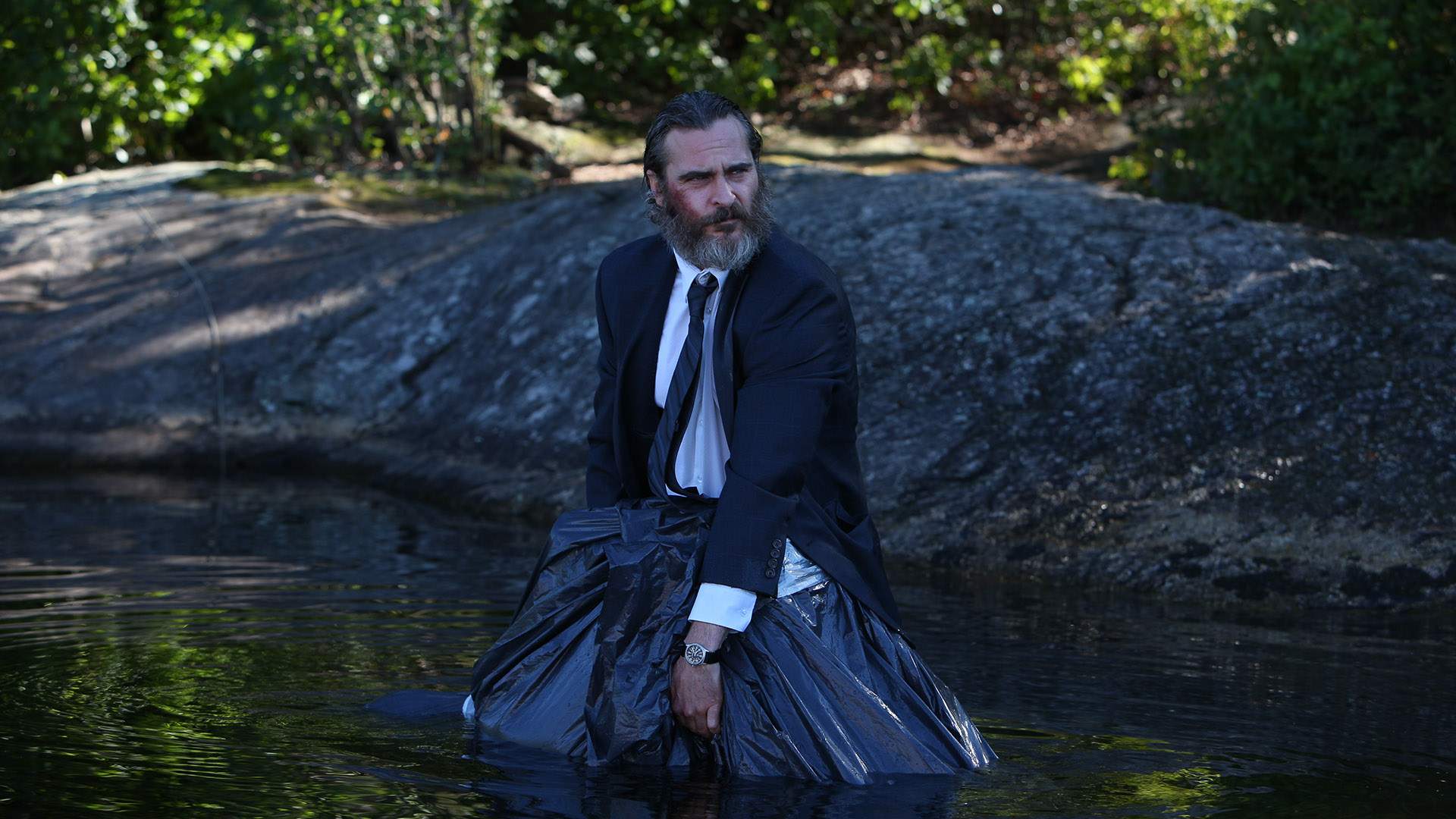You Were Never Really Here
Joaquin Phoenix is at his wounded best in Lynne Ramsay's intense hitman thriller.
Overview
UPDATE, May 16, 2021: You Were Never Really Here is available to stream via Shudder, Google Play, YouTube Movies and iTunes.

Never has a beard felt as important as it does in You Were Never Really Here. Mottled with grey and sporting the texture of steel wool, it's visibly abrasive. It looks scratchy to touch, and as though its coarse mess would grate against the skin underneath. That skin belongs to Joe (Joaquin Phoenix), though he's troubled by more than his choice of facial hair. In fact, the desolation in his eyes and the menacing heft of his frame suggest that his shield of bristles is thoroughly by design. An assassin who rescues young girls from sex trafficking rings — and who's haunted by his own childhood abuse, as well as his past as a soldier and FBI agent — he coats his chin with a wiry nest partly as armour, partly in order to feel something.
The fourth film by directorLynne Ramsay, You Were Never Really Here inspires intricate dissections of every element within its frames — and every aspect of its brooding protagonist, too. Charting Joe's latest assignment, it's ostensibly a crime thriller, but it's really a character study of a despairing man. As the filmmaker demonstrated in We Need to Talk About Kevin, her movies relay their narratives with a minimalistic but expressionist touch. They plunge viewers into their protagonist's headspace with distorted flourishes, yet offer up only what they need to. You Were Never Really Here achieves this with jarring flashes of Joe's memories, with shots that box people in using their surroundings, and with a ragged, raging score by Radiohead's Jonny Greenwood. It also does the same just by staring at Joe, and letting audiences soak up his broken yet brutal presence.
First seen finishing a job in Cincinnati (and trying to finish himself as well), Joe is a man of few modes. Usually he's ruthless and task-oriented, whether arranging his next hit, buying the hammer he'll wield or deploying his deadly skills. When he's at his Queens home with his elderly mother (Judith Roberts), he's kind and caring, a tenor he reserves only for that situation. In-between, he's fighting a war inside — one that he can temporarily put at bay by saving exploited children or by playfully singing with his mum, but can never completely win. The suicide attempts continue, fuelled by emptiness and isolation, although something holds him back. Then Joe is enlisted to rescue Nina (Ekaterina Samsonov), the pre-teen daughter of a New York senator (Alex Manette), and his world goes astray.
Early in the piece, Joe takes a cab from a job, but this isn't merely an updated Taxi Driver. He speaks little and swings a hammer, but the film isn't a riff on Drive. He even watches Psycho with his mother — and recreates its infamous screeching noise and stabbing motion outside of his bathroom — but that's not where this is heading either. As boilerplate as You Were Never Really Here might sound with its tormented protagonist, avenging storyline and penchant for violence, this isn't a picture that walks in anyone's shoes other than Ramsay's own. The writer-director has long delved into the lingering echoes of trauma, not only in the dense and complex Kevin but in her earlier efforts Ratcatcher and Morvern Caller too. If other flicks spring to viewers' minds when watching You Were Never Really Here, that's purely because Ramsay has only made four features in two decades — and, criminally, her last came out seven years ago.
While it's a distinctively immersive Ramsay creation, You Were Never Really Here isn't a film that's big on plot. The novella it's based on numbers less than 100 pages, after all. But if Joe's tale is concise in the hands of author Jonathan Ames (Bored to Death), then it's positively stripped bare on the screen in the bleakest, tensest yet also most rewarding way. There's freedom in such an economical approach — the freedom to build an entire world around Joe's festering pain, to show why he'd rather just disappear, and to explore how the agony he can't shake shapes his entire reality.
Indeed, You Were Never Really Here is disarmingly effective in conveying how post traumatic stress disorder burrows into the deepest recesses of someone's mind, controls their every move, and casts an enormous shadow over everything that they see and hear. And, of course, why it might spark them to lurk both at the edges of society and behind a scruffy beard. Playing Joe, Phoenix won the Cannes Film Festival's best actor prize for more than just his appearance. His is a powerfully wounded performance, a portrayal that wears the character's internal distress as openly as the scars that cover his back and arms. Phoenix boasts a resume filled with damaged figures, be they vicious in Gladiator or sweet in Her, and he's the ideal actor for Ramsay's intense and exacting film. Smashing skulls, cradling bodies in a stream, slurping milkshakes — no matter what he's doing, he's as gripping and galvanising as he's ever been.





